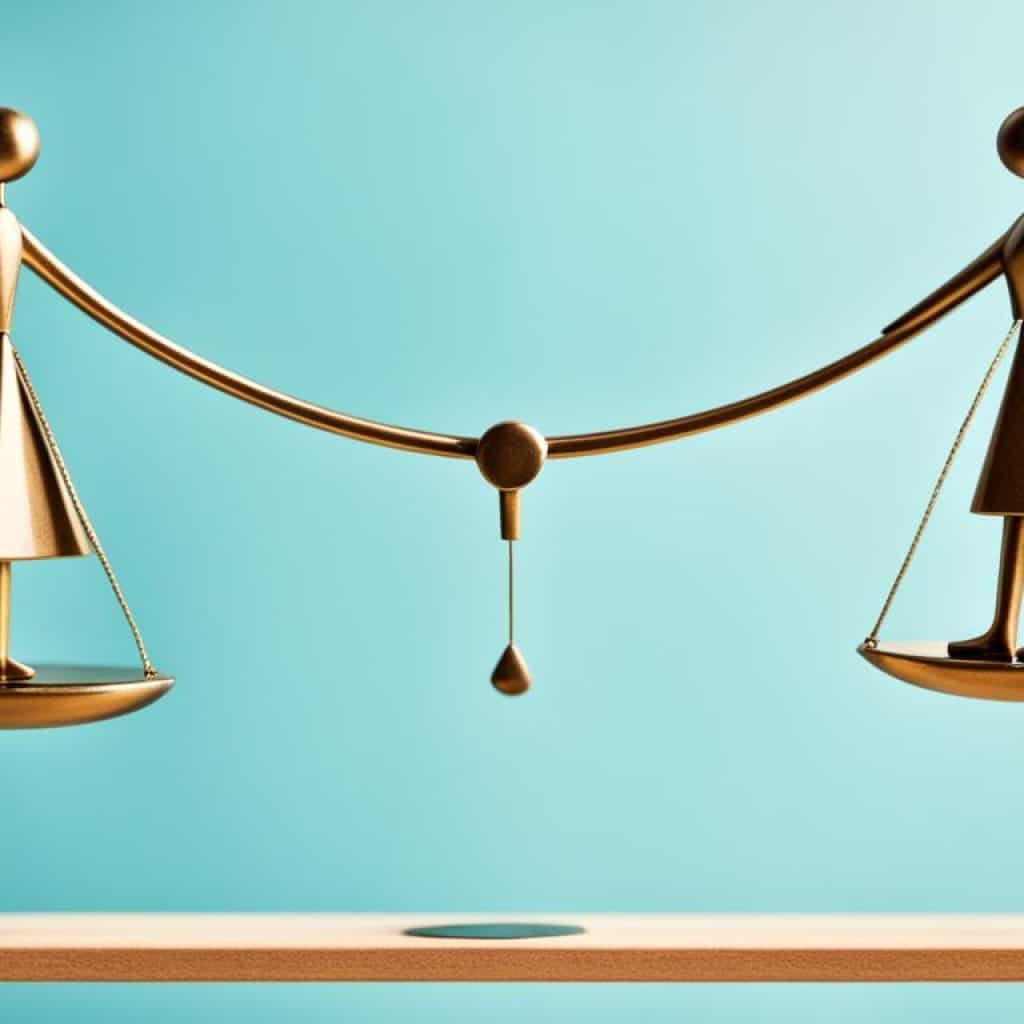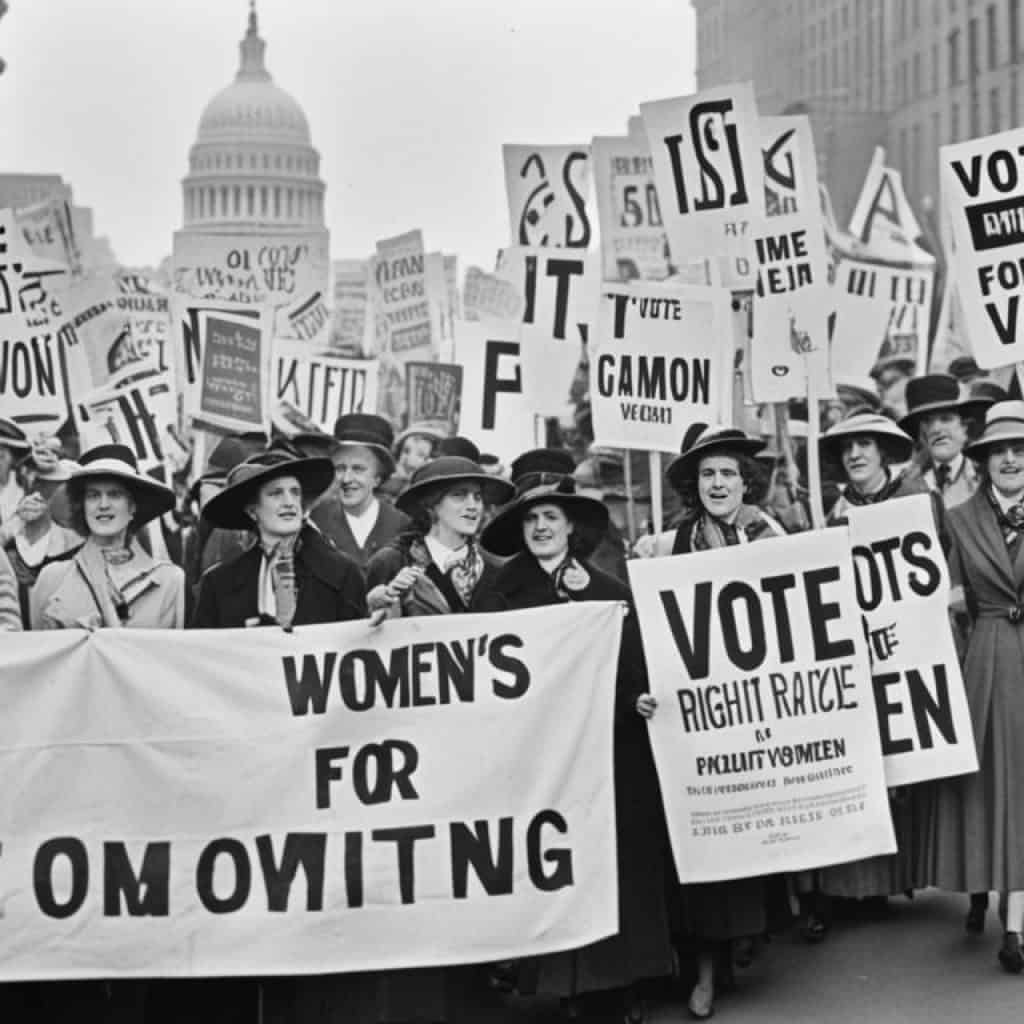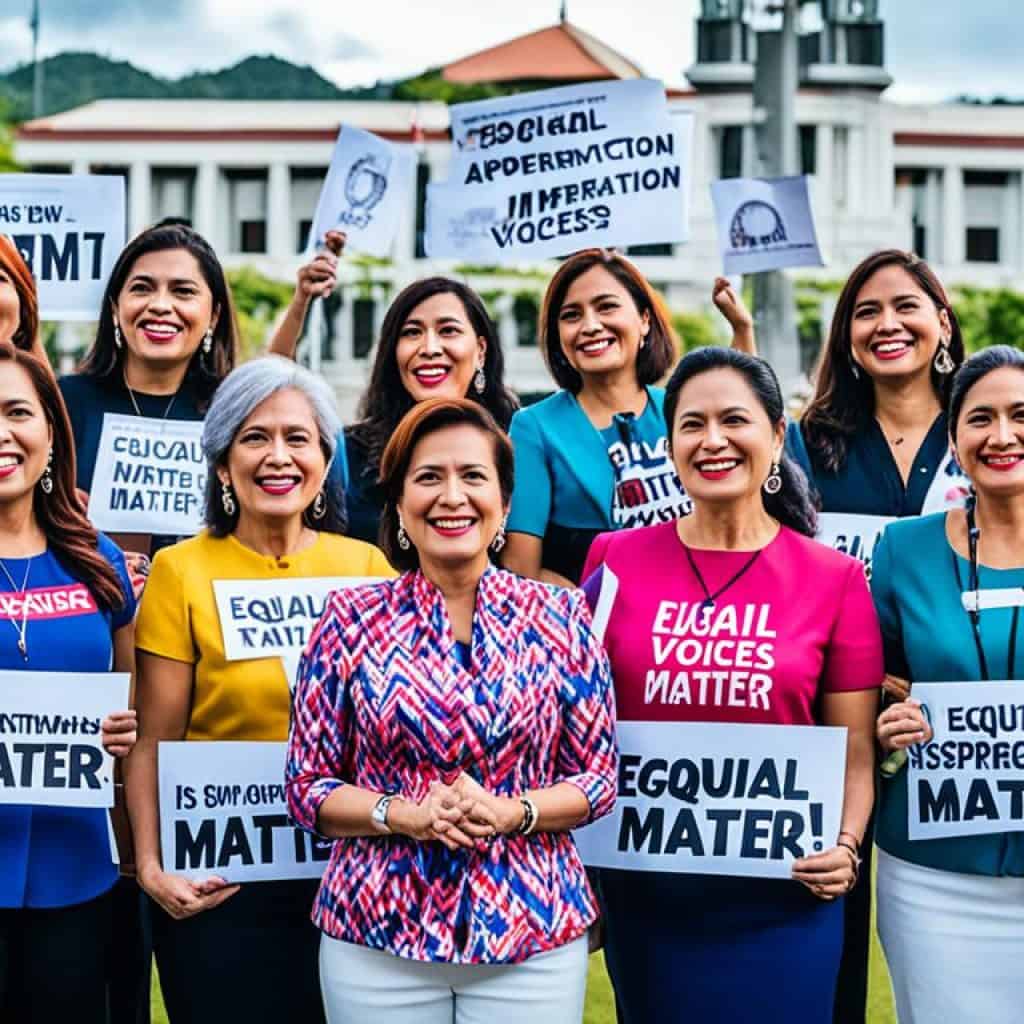Gender equality concerns and the fight for women’s rights have been ongoing battles worldwide, and the Philippines is no exception. Despite progress in recent years, the country still grapples with entrenched gender discrimination and various challenges that impede equal opportunities for all. From gender-based violence incidents to cultural stereotypes affecting gender roles, these issues continue to hinder the advancement of a more inclusive society.
So, what are the 10 gender issues that the Philippines is currently facing, and how do they impact individuals and communities? Are there efforts being made to address these issues and promote gender equality? Let’s dive into these complex matters and uncover the realities of gender dynamics in the Philippines.
Key Takeaways:
- The Philippines faces numerous gender issues, including gender-based violence, discrimination, and cultural stereotypes.
- Gender disparity in education and the gender pay gap are among the challenges hindering gender equality.
- The country ranks 16th in the Global Gender Gap Report, but biases against women persist.
- Efforts are being made to address these issues through policies, legislation, and awareness campaigns.
- Achieving gender equality requires collective action and a commitment to challenging and changing societal norms.
Gender Equality in the Labor Market
Gender equality is essential for fostering inclusive development and creating peaceful societies, as recognized by the United Nations. While the Philippines has made strides in advancing gender equality, challenges persist in the labor market, according to the Asian Development Bank’s report on Gender Equality in the Labor Market in the Philippines.
The labor market in the Philippines still grapples with gender gaps, including disparities in labor force participation, unpaid domestic work, and access to human capital. These gaps contribute to inequalities in employment opportunities, decent work, and social protection. Furthermore, different industrial sectors display varying levels of gender equality.
In order to achieve gender equality in the labor market, it is crucial to focus on several pathways. Firstly, promoting access to work for all genders is essential. This involves removing barriers that hinder individuals from entering or reentering the labor force. Secondly, enhancing employment opportunities, particularly for women, can contribute to narrowing the gender gaps. Lastly, limiting constraints on work, such as cultural norms and expectations, will foster a more gender-inclusive labor market.
Creating a gender-inclusive labor market in the Philippines requires concerted efforts from various stakeholders, including policymakers, employers, and civil society. By implementing measures that address the gender gaps, enhance employment opportunities, and remove constraints on work, the Philippines can strive towards fostering an equitable labor market that offers decent work and social protection for all genders.
Review of Policies for Gender Equality in the Labor Market
Gender equality in the labor market is not only essential for creating a fair and just society but also crucial for achieving national development goals. To address gender disparities and promote equal opportunities, various policies and strategies have been implemented in the Philippines. These initiatives aim to ensure social protection, provide training programs, and establish legislation that supports gender equality in the labor market.
The Asian Development Bank (ADB) acknowledges the significant role of national development goals and macroeconomic policies in promoting gender equality in the labor market. These policies create an enabling environment for gender equality strategies to thrive and address gender disparities effectively. By aligning with international commitments and frameworks, such as the Sustainable Development Goals (SDGs), the Philippines can prioritize gender equality in its national development agenda.
Gender equality strategies and sector-specific policies play a vital role in promoting gender equality in the labor market. These strategies focus on equal employment opportunities, reducing gender gaps in wages and leadership positions, and promoting work-life balance. Sector-specific policies target industries such as agriculture, industry, tourism, and entrepreneurship, addressing gender inequality issues unique to each sector.
“The implementation of social protection initiatives, training programs, and legislative frameworks is crucial for creating an inclusive labor market where gender equality can thrive.”
Social protection initiatives are an essential aspect of ensuring gender equality in the labor market. These programs aim to enhance the economic well-being of individuals and families, promoting access to resources and reducing vulnerability. By providing support for maternity leave, childcare services, and caregiver benefits, social protection initiatives address the unique challenges faced by women in balancing work and family responsibilities.
Training programs are another critical component of promoting gender equality in the labor market. These programs focus on skills development, providing women with the necessary tools and knowledge to excel in their respective fields. By offering training opportunities tailored to the needs of women, including leadership training and entrepreneurship programs, the labor market becomes more inclusive and equitable.
Legislation also plays a pivotal role in supporting gender equality in the labor market. It provides a framework for addressing gender-based discrimination, promoting equal employment opportunities, and ensuring safe and conducive working conditions for all individuals. Antidiscrimination laws, equal pay regulations, and complaint mechanisms empower women to assert their rights and challenge gender-based inequalities in the workplace.
Policies for Gender Equality in the Labor Market (Examples)
| Policy Area | Key Initiatives |
|---|---|
| Social Protection | Maternity leave benefits, childcare subsidies, caregiver support |
| Training Programs | Leadership training for women, entrepreneurship programs |
| Legislation | Antidiscrimination laws, equal pay regulations, complaint mechanisms |
Across the Philippines, policies and initiatives aimed at achieving gender equality in the labor market are fostering positive change. However, more work needs to be done to address the persistent challenges and achieve a truly gender-inclusive labor market. By continuously reviewing and refining policies, strengthening legislation, and increasing awareness, the Philippines can create an environment where all individuals have equal opportunities to thrive and contribute to the nation’s development.

References:
- Asian Development Bank. (Year). Gender equality in the labor market in the Philippines. [Link to the source if available]
Review of Legislative Frameworks and Laws for Gender Equality in the Labor Market
Legislative frameworks play a crucial role in promoting gender equality in the labor market and addressing various issues that affect women’s employment, working conditions, and overall well-being. These frameworks aim to create an environment that is conducive to equal opportunities, protection against discrimination, and the promotion of decent work for all individuals.
Under these legislative frameworks, laws and regulations have been put in place to specifically address gender disparities in the labor market. They focus on promoting women’s access to work, improving working conditions, and ensuring equal treatment and remuneration. Some of the key areas covered by these laws include equal pay, minimum wages, complaint mechanisms, and the prevention of discrimination in recruitment and promotion processes.
One of the important aspects of ensuring gender equality in the labor market is enforcement and monitoring. Labor inspectorate, through regular inspections and investigations, plays a crucial role in ensuring compliance with labor laws and addressing any violations related to gender equality.
“Legislative frameworks support gender equality in the labor market and address issues such as employment, working conditions, discrimination, and decent work.”
Moreover, social dialogue between employers, workers, and relevant stakeholders helps in identifying areas of concern and developing strategies to address them effectively. This dialogue fosters collaboration and joint problem-solving, leading to the development of inclusive policies and practices in the labor market.
Overall, legislative frameworks and laws for gender equality in the labor market provide a solid foundation for promoting equal opportunities, protecting against discrimination, and ensuring decent work for all individuals. However, continuous efforts are needed to enhance the implementation and effectiveness of these laws, as well as to address emerging challenges and promote a truly inclusive and equitable labor market.
Policy and Legislative Recommendations for a Gender-Inclusive Labor Market
Creating a gender-inclusive labor market requires a comprehensive approach that addresses systemic barriers and promotes equal opportunities for all individuals. To achieve this, a set of policy and legislative recommendations have been identified:
- Promoting access to work: Implement measures that enhance access to employment opportunities for both men and women, ensuring equal consideration for all individuals.
- Enhancing employment opportunities: Create policies that encourage the growth of industries and sectors that offer diverse employment opportunities and promote gender equality.
- Limiting constraints on work: Address barriers that hinder women’s participation in the labor market, such as gender-based discrimination, unequal pay, and limited access to resources.
- Improving working conditions: Establish and enforce workplace standards that guarantee safe and inclusive working environments for all employees.
- Providing social protection: Develop comprehensive social protection programs that extend coverage to all workers, including measures to support women during pregnancy and motherhood.
- Enacting antidiscrimination legislation: Strengthen existing antidiscrimination laws and regulations to prevent gender-based discrimination and ensure fair treatment in the labor market.
These policy recommendations are essential for fostering a gender-inclusive labor market and promoting equal access to employment opportunities, access to resources, and reducing the burden of domestic work. Additionally, training programs and skills development initiatives play a significant role in equipping individuals with the necessary knowledge and skills for success in the labor market.
By implementing these policy and legislative recommendations, the Philippines can make significant strides towards achieving gender equality in the labor market and creating a more inclusive society.
Suffrage Movement
The suffrage movement in the Philippines played a vital role in advocating for women’s right to vote and participate in political processes. It was a significant milestone in the fight for gender equality and women’s empowerment.
Dating back to the early 20th century, various bills supporting women’s suffrage were introduced in the Philippines. Prominent figures such as Congressman Filemon Sotto, Melecio Severino, and Mariano Cuenco were among those who championed the cause.
“The vote is our weapon, and we must use it,” said Congressman Filemon Sotto during a speech promoting women’s suffrage.
After years of advocacy and determination, women’s suffrage was finally legalized in 1937. The Philippines became one of the first Asian countries to grant women the right to vote, thanks to the efforts of leaders like Manuel L. Quezon and the Woman’s Suffrage Plebiscite Bill.
This historic achievement paved the way for women’s increased political participation and representation in the Philippines. It marked a significant milestone in the ongoing journey towards achieving gender equality and empowering women in all aspects of society.

| Year | Event |
|---|---|
| 1907 | Introduction of the Women’s Suffrage Bill |
| 1918 | Several bills supporting women’s suffrage introduced |
| 1937 | Legalization of women’s suffrage |
Education
Education plays a significant role in the Philippines, with a remarkable literacy rate of 96.5% according to the Philippines Census of Population and Housing in 2013. This highlights the high value placed on education within the country.
When it comes to gender equality, the Philippines has made strides in achieving parity in literacy and tertiary education participation rates. Honourable Patricia B. Licuanan addressed the United Nations, affirming the commitment to ensuring equal opportunities for both genders in accessing education.
However, despite progress, gender stereotypes and occupational biases still persist within certain fields of education. These biases hinder the equal distribution of opportunities and perpetuate unfair societal norms and beliefs. It is crucial to address these issues and challenge the existing gender stereotypes to create a truly inclusive educational environment for all.
Political Participation
Women in the Philippines are increasingly engaging in political participation, taking on various leadership roles within the government. These positions include senators, congress members, governors, mayors, and judges.
The Philippines has even witnessed the election of two female presidents, namely Corazon Aquino and Gloria Macapagal Arroyo. Their ascension to the highest office in the country has demonstrated the growing influence and capabilities of women in politics.
One factor contributing to the rise of women’s political participation in the Philippines is the support they receive from familial connections. Many female politicians come from families with a history of political involvement, allowing them to gain valuable knowledge, networks, and resources.
Additionally, the Catholic Church, which holds significant influence in Philippine society, has also played a role in supporting women’s political participation. The Church has gradually recognized the importance of gender equality and has encouraged female empowerment in various sectors, including politics.
As more women continue to break barriers and participate actively in politics, the country can benefit from diverse perspectives and experiences. Women leaders bring unique insights to policy-making and have the potential to address issues that affect women and marginalized communities effectively.

Lorem ipsum dolor sit amet, consectetur adipiscing elit, sed do eiusmod tempor incididunt ut labore et dolore magna aliqua. Ut enim ad minim veniam, quis nostrud exercitation ullamco laboris nisi ut aliquip ex ea commodo consequat.
Example Quotes:
“Women’s political participation is a significant step towards achieving gender equality and inclusive governance.” – Senator Maria Sanchez
“The presence of women in politics brings fresh perspectives and helps create policies that reflect the needs and aspirations of all citizens.” – Congresswoman Sofia Rodriguez
Violence Against Women
Violence against women, particularly domestic violence, remains a pervasive issue in the Philippines. Numerous women experience physical, emotional, and sexual abuse within their own homes, leading to severe psychological and physical consequences.
“Violence against women is a violation of human rights and an obstacle to achieving gender equality and sustainable development.” – United Nations
In response, the Philippine government has implemented legislative measures to address violence against women and provide protection for victims. The Anti-Violence Against Women and Their Children Act and the Anti-Rape Law are crucial pieces of legislation designed to curb these alarming rates of violence and ensure justice for victims.
However, addressing violence against women requires more than just legislation. Support services and organizations work tirelessly to provide assistance, shelter, counseling, and legal aid to survivors of violence. These services play a vital role in helping women recover and rebuild their lives.
It is essential to continue raising awareness about violence against women and promoting a culture of respect, empathy, and gender equality. By working together, we can create a society that values and protects the rights and well-being of all individuals.
Support Services for Victims of Violence Against Women
Below are some organizations in the Philippines that provide support services for victims of violence against women:
- Philippine Commission on Women – Provides assistance, information, and resources to women facing violence and promotes gender equality.
- GABRIELA – Advocates for women’s rights and offers various support services, including counseling, legal aid, and temporary shelters.
- Violence Against Women and Children Desks – These desks are set up in police stations nationwide to facilitate the reporting of cases and provide immediate assistance to survivors.
- Women’s Crisis Center – Offers counseling, legal aid, and shelter for survivors of domestic violence.
If you or someone you know is experiencing violence, please reach out to these organizations for help. Remember, you are not alone, and there is support available.
Conclusion
The Philippines has made significant progress in addressing gender issues and promoting gender equality in various aspects of society, including the labor market. However, challenges such as biases against women, gender pay gaps, and violence against women still persist. It is crucial for the Philippines to continue implementing policies, legislation, and initiatives that promote gender equality and work towards creating a more inclusive society.
By addressing these challenges head-on, the Philippines can further advance gender equality and contribute to the achievement of peaceful and inclusive development. It is essential to challenge societal norms and stereotypes, provide equal opportunities for women in the labor market, and ensure equitable pay. Additionally, efforts to combat violence against women must be prioritized, with the implementation of comprehensive support services and the reinforcement of existing legislative measures.
Creating a gender-inclusive society requires ongoing commitment and collaboration from all stakeholders. This includes government bodies, civil society organizations, the private sector, and individuals. Together, by breaking down barriers, promoting equality, and empowering women, the Philippines can build a future where gender equality is a reality.


















Add comment